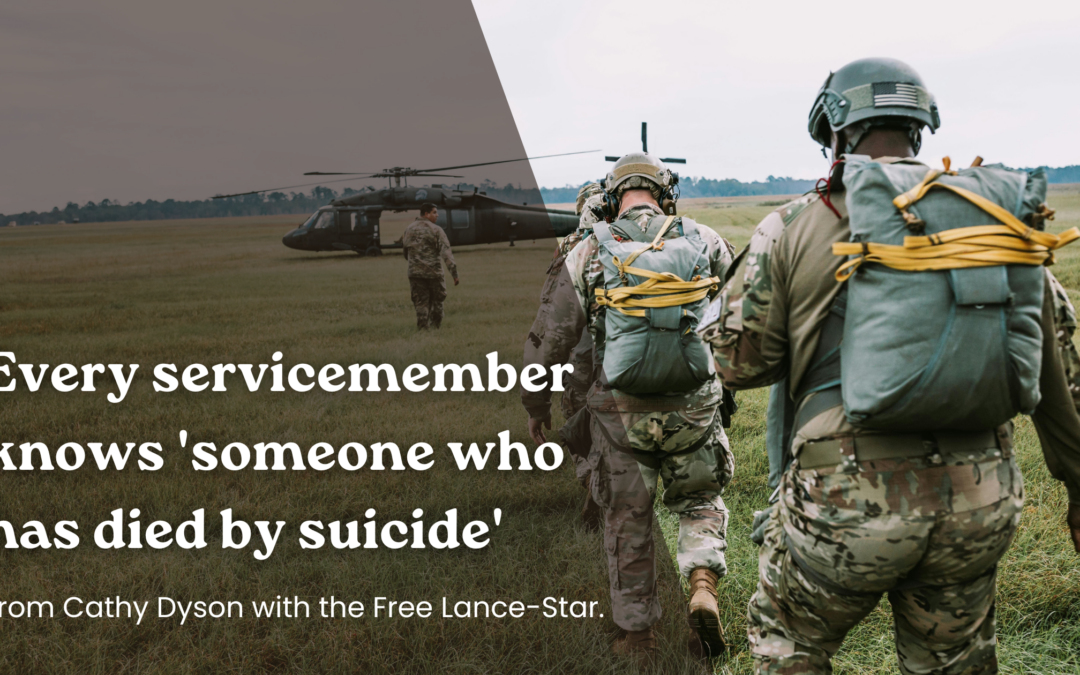On February 16, 2025, the following article, written by Cathy Dyson, was in the Free Lance-Star. From the article:
“For me, it’s gutting because I have family members who are veterans,” said Barb Barlow, executive director of Mental Health America Fredericksburg Region.
The full article:
In her work with Fredericksburg-area veterans, Nicole Bassing sees a grim similarity among those who have served their country, no matter their age, gender or military branch.
“I don’t think there’s any servicemember who would say they don’t know someone who has died by suicide,” said Bassing, a Rappahannock Area Community Services Board coordinator who works with veterans in the court system. “We’ve certainly seen suicide ideations, attempts or even going through with it. It is, unfortunately, quite common.”
- Marine Cpl. Joseph Donald, who left the Marine Corps in 2011 after six years and tours in Afghanistan and Iraq, said it seemed like he lost more friends to suicide than combat. He said therapy helped him with anxiety and depression.
- Joseph Donald, a Stafford County veteran who left the Marine Corps in 2011 after six years and tours in Afghanistan and Iraq, said it seemed like he lost more friends to suicide than combat.
“At one point, I was losing one to two Marines a year, direct friends or guys I knew from the unit,” he said. “It doesn’t get much tougher than that.”
The latest data backs up their points about the continuing prevalence.
- Former Marine Joseph Donald is now 41.
- The national rate of veteran suicides was 34.7 per 100,000 in 2022, which makes up the data included in the 2024 National Veteran Suicide Prevention Annual Report.
At the same time, the suicide rate for the general population was 18.4 per 100,000 people.
Virginia’s numbers showed a similar glaring difference: a rate of 26.6 suicides per 100,000 for veterans and a rate of 16.9 suicides per 100,000 for the general population.
“Veterans deal with horrors that your average person who has no military affiliation couldn’t even begin to imagine or process,” said Chrissy Blankenship, RACSB’s lead therapist for veterans and families.
Then, returning to society and new daily routines — resuming relationships, paying bills and even deciding what to do instead of having schedules dictated for them — can be a lot to deal with, especially with ongoing nightmares from combat, Blankenship said.
“It’s hard just being able to interact in a way that is normal,” she said, putting air quotes around the word normal.
‘It’s gutting’
The report was released in late December and analyzes information gathered from 2022. It’s online at mentalhealth.va.gov/suicide_prevention/data.asp.
“For me, it’s gutting because I have family members who are veterans,” said Barb Barlow, executive director of Mental Health America Fredericksburg Region.
Her son is 43 and suffered severe post-traumatic stress syndrome after multiple tours in Iraq and Afghanistan. He said he felt a disconnect when he came home because everyone was so happy to see him, he couldn’t tell them about the things he had experienced.
“Some of the things he went through were pretty horrific,” Barlow said.
Likewise, Donald in an explosion in Afghanistan suffered a broken back and was processed out of the military. In addition to the other stresses he dealt with, he said he continues to battle the Marine Corps to get his Purple Heart.
As the years passed and he got more dreaded phone calls about suicides, it made him wonder.
“When I would lose one of my brothers to that, it worried me, and I thought, could that be me one day?” he asked.
With nudging from his wife, Donald, now 41, got treatment through Veterans Affairs and credits the therapy, along with his family and God, for helping him deal with some “deeply rooted anxiety and depression.”
“It’s an ongoing thing,” said the stay-at-home father, “but I’m in a much better state than I once was.”
Barlow’s son took a similar route. The King George High School graduate got treatment, earned his degree and is living the life he always dreamed in Florida, she said.
“I’m very proud of him that he served our country and he came out on the other side of all that hurting he was experiencing,” Barlow said.
Regional coalition
Along with Bassing, Blankenship and others who work with veterans in the Fredericksburg area, Barlow stresses that it takes a community to support servicemembers readjusting to society.
Their organizations are part of the regional Suicide Prevention Coalition, working alongside VA clinicians, the Rappahannock Area Health District, Mary Washington Healthcare and independent counselors and providers.
Angela Jameson coordinates the suicide prevention program in the local VA offices, through the Central Virginia VA Healthcare System, and Barlow said she’s thrilled to have her as a “subject-matter expert” from Veterans Affairs.
The Free Lance–Star reached out through VA channels last month to speak with Jameson, but the request was not approved.
The coalition is working on the VA’s goal to distribute safety resources to at least 75% of clinical providers and community groups by September. Locally, Michelle Wagaman, a prevention director at the RACSB, was part of the team that created Lock and Talk, a state initiative that encourages locking up guns, as well as medicines, in an effort to prevent suicide.
Firearms can be stored in lockboxes with trigger or cable locks, or they can be locked in one place with ammunition in another.
“People often think that if somebody has decided to end their life, there’s nothing we can do about it,” Bassing said. “That’s not the reality.”
The extra barrier can put time and distance between the person and their possible method of suicide — and allow a few minutes to rethink the decision.
“Often times, there’s little planning that goes into these attempts,” Wagaman said at a 2023 event.
RACSB offices throughout the Fredericksburg region as well as Mental Health America of Fredericksburg provide the locks and boxes for free. The organizations also work with local health department offices to provide Narcan, which reverses an opioid overdose.
‘Understandable’ struggles
When veterans need help with adjusting, or if substance abuse is involved, which is often the case, the agencies “continue to put information out there that treatment is available,” Blankenship said.
“We really want to destigmatize” (the need to ask for veterans to ask for help), said Blankenship, who served in the Army for three years and was an Army wife for 13 more. “It’s understandable that you would have struggles.”
Training also is available for family or community members who want to recognize the signs of potential suicide and what action to take. Some fear that asking people if they’re considering hurting themselves will put ideas in their head.
Barlow said she felt a similar angst, even with her training, when she dealt with two people who were having issues. She felt better being able to refer them to the national 988 helpline, available 24/7 for those having any type of mental health crisis.
“I sat there and shared that I was concerned for them enough that I think we should call 988 together,” she said. “I started the conversation and said, when you’re ready, I will leave and you can be alone. Each time that was extremely helpful.”
Cathy Dyson: 540-374-5425

